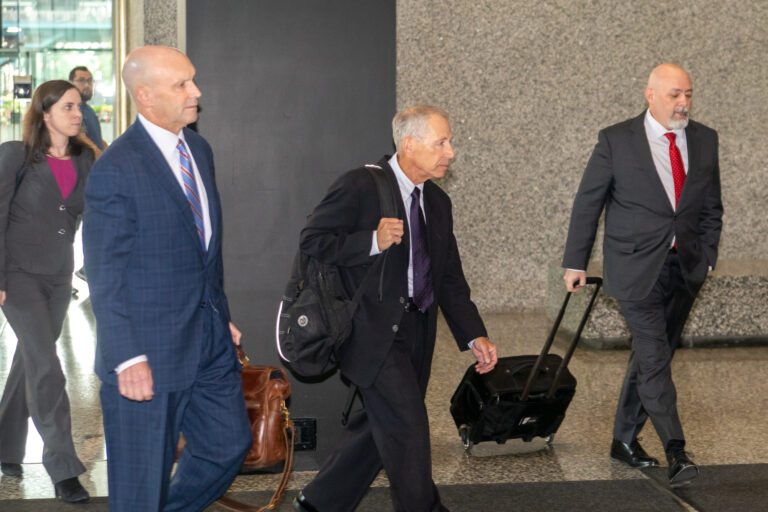Former Illinois House speaker appears in separate courtroom ahead of own trial
CHICAGO – After years of pushing in Springfield, AT&T Illinois’ executive team was thrilled when the Illinois General Assembly in 2017 passed legislation that would get the company out from under expensive obligations to maintain its aging copper landline wires in Illinois.
“Game over. We win,” AT&T Illinois President Paul La Schiazza wrote to a colleague after the final vote to override then-Gov. Bruce Rauner’s veto of the legislation on July 1, 2017. “I am very proud of our team persevering through the most difficult of circumstances.”
The previous months had been a rollercoaster for La Schiazza and his team. They hadn’t been sure until the very end of the General Assembly’s spring legislative session if powerful Illinois House Speaker Michael Madigan would even call AT&T’s prized legislation for a vote, and then they were caught off guard by Rauner’s veto.
For his efforts to finally pass the measure, La Schiazza was awarded an $85,000 bonus the following February. But in the more immediate future, La Schiazza received a request he perceived as a conspicuous wink that those in Madigan’s orbit were keeping score – and that the speaker’s efforts needed further recognition.
“Here we go…this will be endless,” La Schiazza wrote to a colleague in forwarding an email from Madigan’s son asking AT&T to be a sponsor of an upcoming charity gala.
“I suspect the ‘thank you’ opportunities will be plentiful,” the colleague replied.
“Yep…we’re on the friends and family plan now,” La Schiazza wrote back.
Federal prosecutors showed the email during the wind-down of La Schiazza’s trial on Monday, in which the former AT&T president is accused of bribing Madigan via an alleged do-nothing consulting contract for a political ally worth $22,500.
Government lawyers rested their case against La Schiazza on Monday afternoon, while La Schiazza declined to put on a defense case. The jury will get the case on Tuesday after attorneys for both sides make their closing arguments.
La Schiazza maintains AT&T’s successful push for its 2017 legislation was the result of a sophisticated yearslong lobbying strategy and the consulting contract for former state Rep. Eddie Acevedo was meant to simply build goodwill with Madigan.
Prosecutors sought to prove Acevedo, who has already served a six-month prison term for tax evasion related to his lobbying business, did no work for AT&T in the nine months the company paid him indirectly through one of its longtime contract lobbyists.
That lobbyist, Tom Cullen, told the jury earlier in trial that he agreed to pay Acevedo in the spirit of being a “team player” for his longstanding client and that he never expected Acevedo to do any work.
And on Monday, an FBI agent testified that he couldn’t find any work product from Acevedo in more than 200,000 pages of documents produced from both AT&T and APEX Strategies, the lobbying firm owned by Acevedo’s sons. Acevedo had purportedly been contracted to complete a report about the political dynamics within the Latino caucuses of the Illinois General Assembly and Chicago City Council.
Cullen testified that months after Acevedo agreed to the $2,500-per-month arrangement – after first balking at the offer – he jokingly checked in with one of AT&T’s internal lobbyists about the phantom report.
“Hey, have you seen that report?” Cullen recalled asking the other lobbyist with a laugh. “I think neither of us expected there to have been a report.”
Acevedo, who’d recently retired after 20 years in the Illinois House, had been recommended for work with AT&T by one of Madigan’s closest confidants, longtime Springfield lobbyist Mike McClain.
McClain, who’d recently officially retired from lobbying but still hung around Springfield, had first reached out to an AT&T lobbyist in February of 2017 about a “small contract” for Acevedo. Two days later, cell phone records entered into evidence Monday showed that McClain and La Schiazza spoke shortly before La Schiazza emailed a handful of colleagues informing them that McClain had assigned him AT&T’s bill as a “special project.”
La Schiazza’s attorneys pointed out that their client didn’t take an active role in recruiting Acevedo – and never once spoke to him over the phone, per the government’s cell phone records. But prosecutors noted he signed off on the arrangement and pushed for it to get done quickly in emails to his colleagues.
Meanwhile on Monday, Madigan spent hours in a courtroom five floors below La Schiazza’s trial in Chicago’s Dirksen Federal Courthouse while his attorneys went through motion after motion ahead of his bribery and racketeering trial scheduled for next month.
Judge John Blakey held some of his decisions until he could review contested evidence, but delivered a few key rulings, including excluding a wiretapped phone call between Madigan and McClain, his co-defendant in the trial.
McClain has already been convicted along with other ex-lobbyists and executives for electric utility Commonwealth Edison of a similar bribery scheme to what’s alleged in the AT&T trial, though on a larger scale. McClain and his co-defendants are fighting the convictions after a U.S. Supreme Court ruling this summer narrowed the definition of “bribery.”
Just as the judge did in the ComEd case, Judge Blakey barred prosecutors from playing a call in which Madigan joked with McClain that certain labor consultants that contracted with ComEd “made out like bandits.”
“For very little work too,” McClain agreed.
Blakey agreed with Madigan’s attorneys that the call would be confusing and prejudicial, because the consultants named in the call were not, in fact, among the speaker’s allies in the government’s alleged bribery scheme.
The judge also ruled that while the jury can hear about the payments McClain arranged for an ousted political operative in Madigan’s political organization, prosecutors are barred from talking about the sexual harassment allegations that caused the operative’s ouster.
Blakey also noted that jury selection in Madigan’s trial may take as long as four days, meaning opening statements in the trial could be pushed to Oct. 15.

